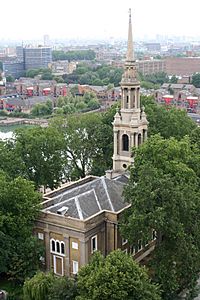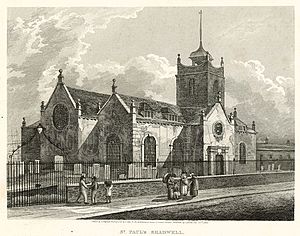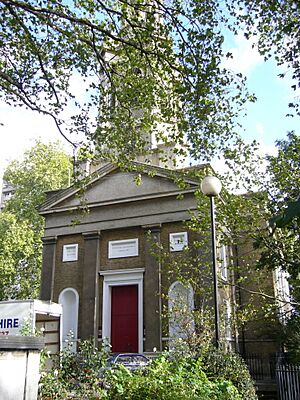St Paul's Church, Shadwell facts for kids
Quick facts for kids St. Paul's Church, Shadwell |
|
|---|---|

St Paul's Church, Shadwell
|
|
| Location | East End of London |
| Country | United Kingdom |
| Denomination | Church of England |
| Churchmanship | Charismatic/Evangelical Anglican |
| Architecture | |
| Heritage designation | Grade II* |
| Architect(s) | John Walters |
| Administration | |
| Diocese | London |
St Paul's Church, Shadwell, is a historic church in the East End of London, England. It's a Church of England church and is considered a very important building. People often call it the Church of Sea Captains.
History of St Paul's Church
The first church building, known as the Church of Sea Captains, was built in 1656. A man named Thomas Neale helped pay for most of it. It's believed that 75 sea captains are buried at this church.
A minister named Matthew Mead led the church from 1658 to 1662. He was replaced because his beliefs were different from the official church at the time. During the terrible Great Plague of London, the churchyard was one of five places used to bury people who had died from the plague.
The church was rebuilt in 1669. It became the main church for the area of Shadwell. Before this, Shadwell was part of a larger parish called St Dunstan's, Stepney. St Paul's was named after St Paul's Cathedral. It was the first new parish created from St Dunstan's, Stepney, since Whitechapel in 1338.
Many famous people visited or had connections to St Paul's. John Wesley, a very important preacher, spoke there. Captain James Cook, the famous explorer, worshipped at the church. His oldest son was even baptized there in 1763. Jacob Phillip, the father of Captain Arthur Phillip (who became the first Governor of New South Wales in Australia), also worshipped there.
Other notable people baptized at St Paul's include William Henry Perkin. He was a chemist who discovered the first artificial dye. Jane Randolph, the mother of Thomas Jefferson (who later became a President of the United States), was also baptized there. The church built in 1669 was made of brick. It was about 26.5 meters long and 19.2 meters wide.
The 1669 church was taken down in 1817. The building you see today was finished in 1821. It was designed by an architect named John Walters. This church is the only building designed by John Walters that is still standing. Eight bells, made in 1819, were put into the church tower.
In the 1840s, a part of the churchyard was bought by the London Dock Company. They needed the land to make Shadwell Basin bigger.
After people stopped being buried in the churchyard, it was turned into a garden in 1886. This was done by Fanny Wilkinson and the Metropolitan Public Gardens Association. Some of the trees, like the London plane trees, are still there from the original garden design. The rectory garden has a very old Black Mulberry tree. This tree is thought to be connected to French Protestant families who moved to the East End. They helped the weaving industry grow there.
In 1950, the church building was given a special status. It became a Grade II* listed building. This means it's a very important historic building that needs to be protected.
St Paul's Church Today
In January 2005, a group from another church, Holy Trinity Brompton, came to St Paul's. They joined the existing members to help serve the local community. This was part of a plan by the Bishop of London to help churches that were becoming smaller.
The Rev Ric Thorpe became the new leader of St Paul's on January 20, 2005. The Rev Jez Barnes helped him as an associate pastor. Ric Thorpe became the main Rector in 2010. He left in 2015 to become the Bishop of Islington.
St Paul's Church follows the charismatic and evangelical Anglican traditions. This means they focus on a lively and personal faith.
St Paul's in Books
The church is an important place in James Lovegrove's book, Sherlock Holmes and the Shadwell Shadows.
More Information
- Official website: http://www.stpaulsshadwell.org/
 | Valerie Thomas |
 | Frederick McKinley Jones |
 | George Edward Alcorn Jr. |
 | Thomas Mensah |



